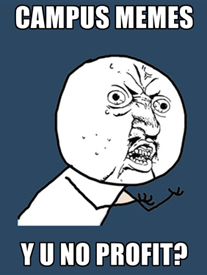I Can Haz Marketing Disguyzd as Yoo-nee-ver-sity Meme?
 Memes are nothing new to the interwebz, but university memes are – in the past two weeks, scores of them have popped up on Facebook. A repository of them can be found at CampusMeme which, according to Bostino, was co-created by Saif Altimimi, CEO of NoteWagon, a service allowing students to upload their course notes and unlock badges that give students “access to awesome prizes.”
Memes are nothing new to the interwebz, but university memes are – in the past two weeks, scores of them have popped up on Facebook. A repository of them can be found at CampusMeme which, according to Bostino, was co-created by Saif Altimimi, CEO of NoteWagon, a service allowing students to upload their course notes and unlock badges that give students “access to awesome prizes.”
Why would NoteWagon set up a site for college memes? Marketing. The company ran a meme contest, where the most-liked memes could win $50 cash. Altimimi also kick-started the Facebook meme trend by creating meme pages for a number of colleges, including the University of Waterloo, McGill University, University of Michigan and Boston University. While this has fueled the creation of meme pages by those not affiliated with NoteWagon, according to StartupStats, as of February 8, Altimimi asserted that NoteWagon owned about 80 percent of the pages.
Campus memes have reached enough of a critical mass to be listed on KnowYourMeme, but the marketing angle makes the trend less subversive, no?
Dude, where’s my official Facebook page?
There are days I wonder if the TPTB at Facebook wake up bored and decide to have some fun with their legion of members.
I suspect January 24, 2012 was one of those days. The numerous colleges and universities – including the University of Wisconsin – Green Bay, the University of Rochester, Ithaca College, Monroe Community College – had their official pages reclassified as “community” pages. The former community pages – the pages that take the majority of information from what’s posted on Wikipedia — were renamed “official.”
“Someone kidnapped my four year old,” lamented Todd Sanders, social media specialist, UW-GB.
Those changes not only demoted the page and diluted the brand of the once official-now community page, but also allowed users to edit content on the “info” section, meaning that anyone could change an institution’s category, name, address, phone number, URL, email address and business hours.
Other schools, including Colorado State University; California State University, Dominguez Hills; and Alma College, had been reclassified weeks or months earlier, similarly without warning.
It’s a bit like Facebook forced colleges to leave the gas caps off their cars, confident in the belief that the general public wouldn’t dump sugar into the gas tanks.
And then, it was over. On January 27, many of the affected Facebook pages were reclassified (or, re-reclassified) as official. According to “Nicci” a Facebook rep commenting on a UWGB post, the situation was due to “a technical issue on our part and is now resolved.”
This is all well and good. But it also serves as a reminder that our digital brands are tied up with companies that can change policies at will, leaving us with little to do about it. Perhaps this was a glitch, but it’s also a bellwether: make sure there are multiple ways your brand can thrive online.

